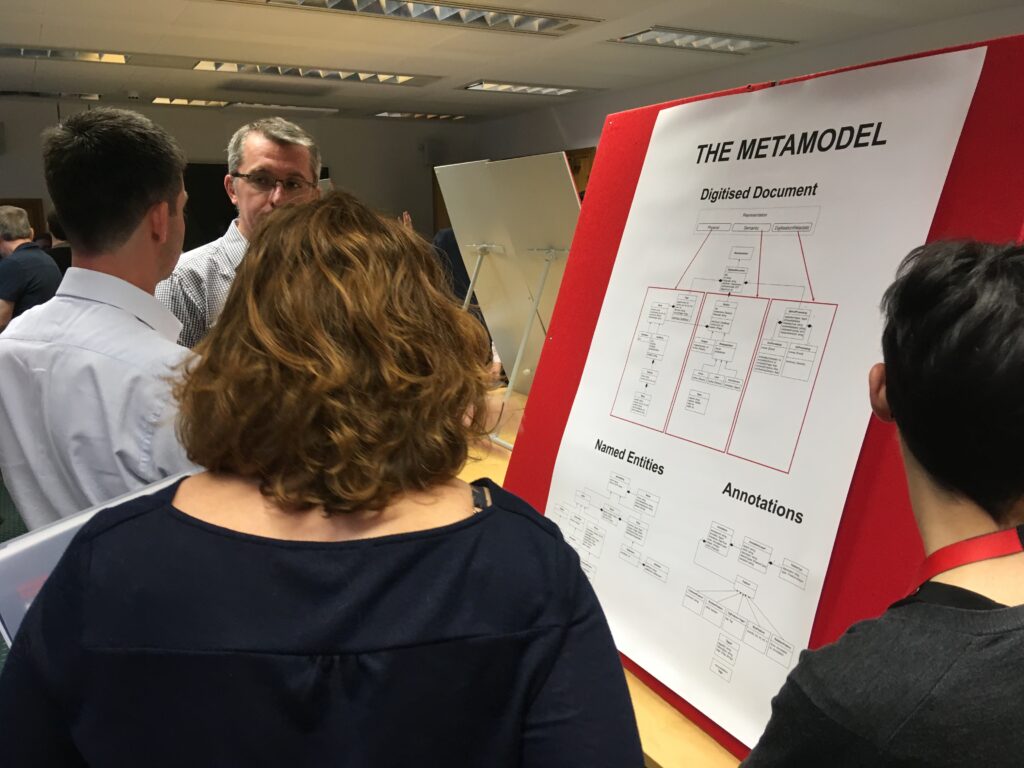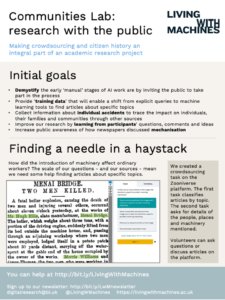On holding a poster session for colleagues
Dr Mia Ridge writes… I’ve meant to write this post for a long time, but as we’re looking to (finally) hold an in-person poster session again next month, it’s a good time to finish it and hit ‘post’!
Back in 2019 (when holding an in-person event seemed like a completely ordinary thing to do) we held a drop-in ‘show and tell’ poster and demo session to share early project work with colleagues at the British Library and Alan Turing Institute. Read on for why…
After some trial and error, the Living with Machines project has developed a rhythm of ‘work iterations’ a few months long, where we organise ourselves around work on particular research questions, methods, sources or tasks. At the end of each iteration, we hold an internal workshop to review progress, reflect on our practice, and look ahead to the next iteration. The workshops are a chance to present our work back to each other – in a project this large it’s easy to lose track of what’s happening in other groups.
We’ve experimented with various ways of presenting our work back to each other, including presentations in the workshop (which worked less well when we switched to online meetings), pre-circulating reports, and posters. This time, we wanted to try a poster session to share our work more widely. We knew there was a lot of curiosity about the project in both the British Library and the Turing Institute, and thought the opportunity to put faces to names and ask questions in a casual environment would be helpful.
Designing a poster for a ‘show and tell’ session isn’t easy – it takes work to summarise diverse research activities into a concise, visual format that helps people understand what was done and why it matters – but poster sessions are a great way to see a lot of ideas at once, talk to researchers about their work, and chat to other attendees. The Library also has a tradition of ‘drop in’ sessions with posters and information stands, so this format seemed like a great way to share some project news and give Library and Turing folk a chance to mingle. It was also partly inspired by the HILT Digital Humanities Summer Schools closing ceremony where each class presented a brief overview of what they’d learned and/or made, and by the agile software development ‘demo’.
Once we knew we wanted to hold the sessions, we committed to them, sending out ‘save the date’ emails three months in advance – before we knew quite what it’d involve. They invited people to ‘a “show and tell” session for the first results of various “minimum research outputs” for the Living with Machines project. In the spirit of our highly adaptive project, we don’t know exactly what form these results will take, but they might include interactive screen-based demonstrations or visualisations, posters, datasets, slideshows or software models’.
We aimed for a very relaxed session, encouraging the team to re-use other material (slides, demos, text, etc) they were preparing for the end of iteration workshop. Some people had posters, others had laptops showing work in progress – but it gave us all a chance to work on our ‘elevator pitches’ summarising our work and why it mattered.
We ended up holding two sessions, one on October 24, 2019, in the Panizzi room in the British Library, and another in a space near the Turing’s kitchen on the first floor of our St Pancras building on November 18, 2019. They attracted a crowd of people from across the Turing and Library, including the British Library’s CEO!
You can see some posters from Living with Machines on the British Library’s research repository.


